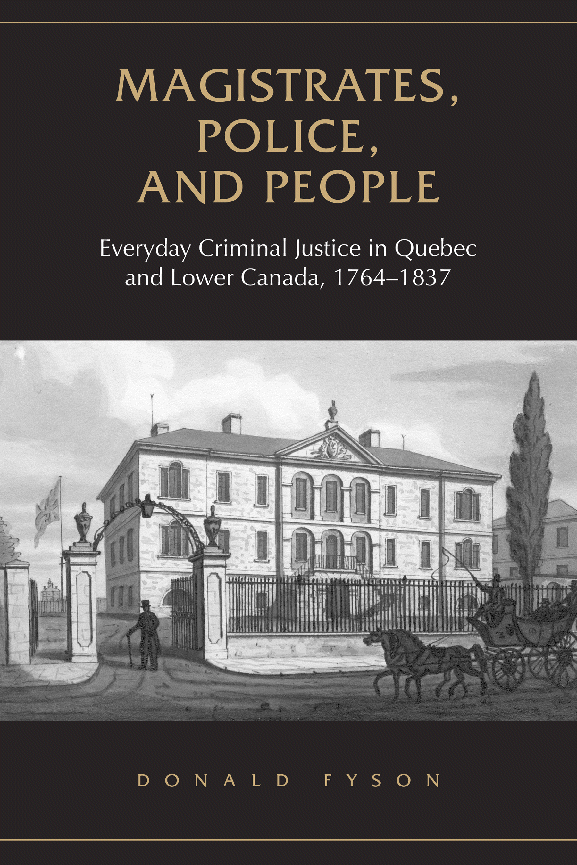Companion website
This is the companion website to my book Magistrates, Police, and People, published in 2006. It presents information on the book, a list of corrigenda and additional material not published in the book itself.
Full reference and availability
Fyson, Donald. Magistrates, Police, and People: Everyday
Criminal Justice in Quebec and Lower Canada, 1764-1837. Toronto:
Osgoode Society for Canadian Legal History / University of Toronto Press,
2006. 464 p. ISBN 0-8020-9223-3
UTP
Amazon.ca
chapters.indigo.ca
Amazon.com
Amazon.co.uk
A French translation of the book, which is also a slightly updated
edition, was published in 2010:
Une traduction et mise à jour du livre a été publiée en 2010 :
Fyson, Donald. Magistrats, police et société : la justice
criminelle ordinaire au Québec et au Bas-Canada (1764-1837).
Montréal, Hurtubise, 2010. 592 p. ISBN 978-289647-273-4
Hurtubise
Amazon.fr
Archambault.ca
chapters.indigo.ca
Prizes
My book has been awarded a number of prizes and honourable mentions. Full details here.
Reviews
A full list of reviews, progressively updated, is available here.
Publisher's abstract
The place of criminal justice in a conquered colony is always problematic. Quebec is no exception, with many historians suggesting that between the Conquest and the Rebellions, the colony's Canadien inhabitants both boycotted and were excluded from the British criminal justice system. This book challenges that simplistic view of the relationship between criminal law and Quebec society. Based on extensive research in judicial and official sources, it offers the first comprehensive study of the everyday workings of criminal justice in Quebec and Lower Canada. Focussing on the justices of the peace and their police, Fyson examines both the criminal justice system itself and the system in operation, as experienced by those who came in contact with it. He takes issue with many received interpretations, such as the profound effects of the Conquest: in practice, criminal justice changed little, in the definition of offences or the nature of the system. Conversely, in the decades from the 1760s to the 1830s, criminal law and justice were transformed, responding to the social and economic changes that swept the colony and to the desires of local elites, both Canadien and British. The magistracy and the police, made up of men from both ethno-cultural groups, became increasingly extensive and professionalized, in a modernization often ascribed to the period following the Rebellions. The relationship between the people and the system also changed dramatically. This is best exemplified by the steady rise in prosecutions: from being relatively marginal, criminal justice became increasingly familiar to both Canadiens and British in the colony, especially in urban areas. Though the system was significantly biased, its flexibility provided a source of power for ordinary citizens. At the same time, everyday criminal justice offered the colonial state and colonial elites a powerful though often faulty means to impose themselves on Quebec society.
Cover
For the full dustjacket (PDF), click on the image.

